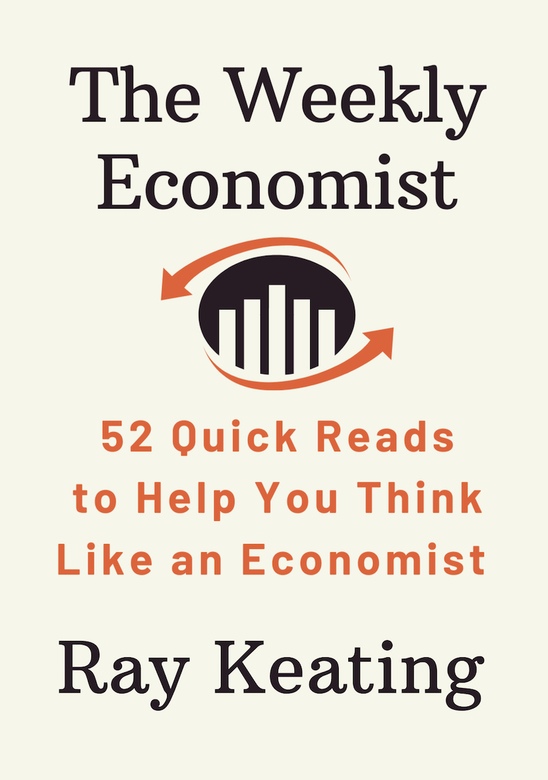
Author and economist Ray Keating doles out a lifetime’s worth of insight in The Weekly Economist: 52 Quick Reads to Help You Think Like an Economist, the latest non-fiction work from this prolific author.
Encouraging readers to think more like economists, regardless of experience or expertise in the field, Keating has created an accessible and comprehensive guide to concepts that regularly baffle the average person. He argues that before one can criticize or successfully navigate the world of economics, one must thoroughly understand it, and this book can certainly help that happen.
From intellectual property rights and labor unions to private charities and governmental bailouts, this book runs the gamut when it comes to economic issues, and will invariably help readers think more critically about the financial machinery that runs the world. The stock market alone is enough to confuse many people, yet he disentangles each layered subject in a handful of pages.
There are succinct explorations of gender pay gaps, corporate profit margins, supply chains, bankruptcy, and countless other topics to which entire books could be devoted, yet Keating wraps them up in single-serving soapbox rants. The book also feels contemporary, addressing concerns of today, such as automation, wealth inequality, government failure, and the oligarchic behavior of corporations. The order of chapters sometimes feels intentional, but there are also some tangential leaps in topic, demanding a dextrous mind to keep up.
Those on the political and ideological left will likely disagree with many of the policy recommendations, viewpoints, and “hot takes,” as Keating is decidedly conservative in his economic outlook. He may begin this collection with a refutation of Gordon Gekko’s legendary adage “Greed is good,” but he also denigrates socialistic practices in favor of capitalistic traditions whenever possible. This includes broad generalizations of how these alternative systems work, as though there is only a single method of executing such philosophies, which at times can feel dismissive and biased. For example, he devotes less than two pages to criticizing Marxist ideology as childish and ill-informed. The chapters on socialism and the tragedy of the commons are similarly surface-level and reductive.
That said, for those readers aligned with his point of view, the book does an excellent job creating bite-sized lessons that can be read and understood in under ten minutes. While the book could be consumed as a weekly read, as the title suggests, the information doesn’t compound too quickly, and the prose is surprisingly conversational, rather than being a dense or academic read. However, some of the chapters or concepts can feel rushed as a result, or simplified beyond the point of factual accuracy. This informality can work against the author’s credibility, particularly when his presentation of objective concepts veers into a presentation of subjective opinions.
Overall, Keating makes a subject as potentially dry as economics into something dynamic and interesting. A natural storyteller, he carefully dissects an intimidating sphere of modern existence into a book that nearly anyone could learn from and enjoy.
Book Links
STAR RATING
Design
Content
Editing
Get an Editorial Review | Get Amazon Sales & Reviews | Get Edited | Publish Your Book | Enter the SPR Book Awards | Other Marketing Services























Leave A Comment